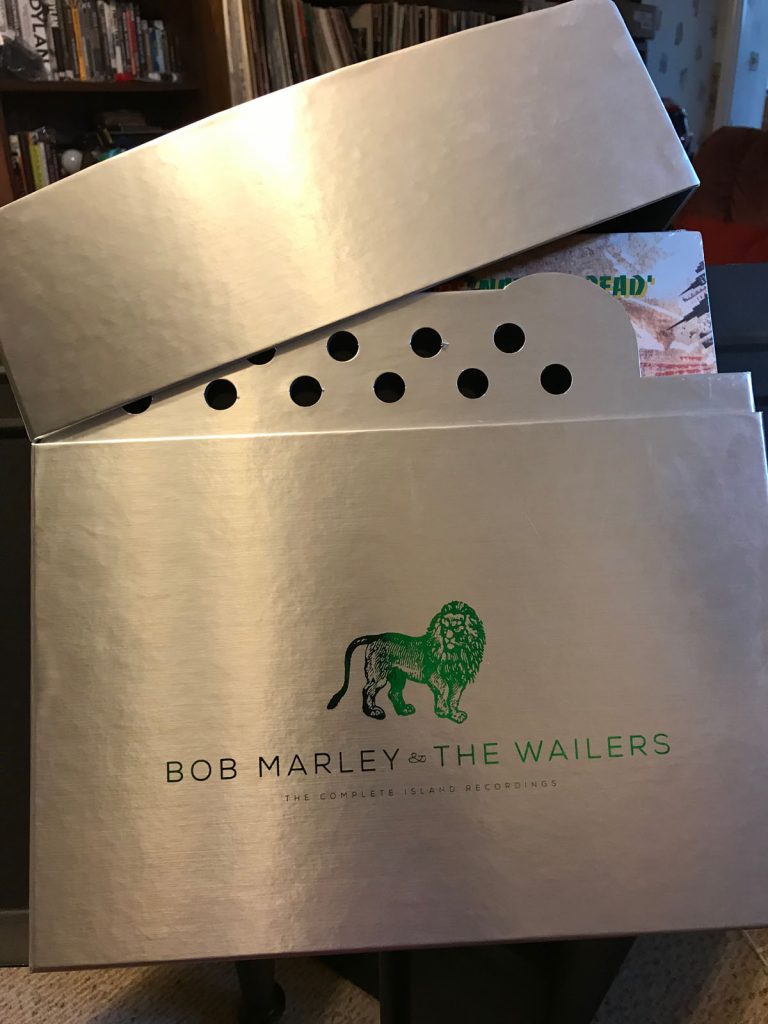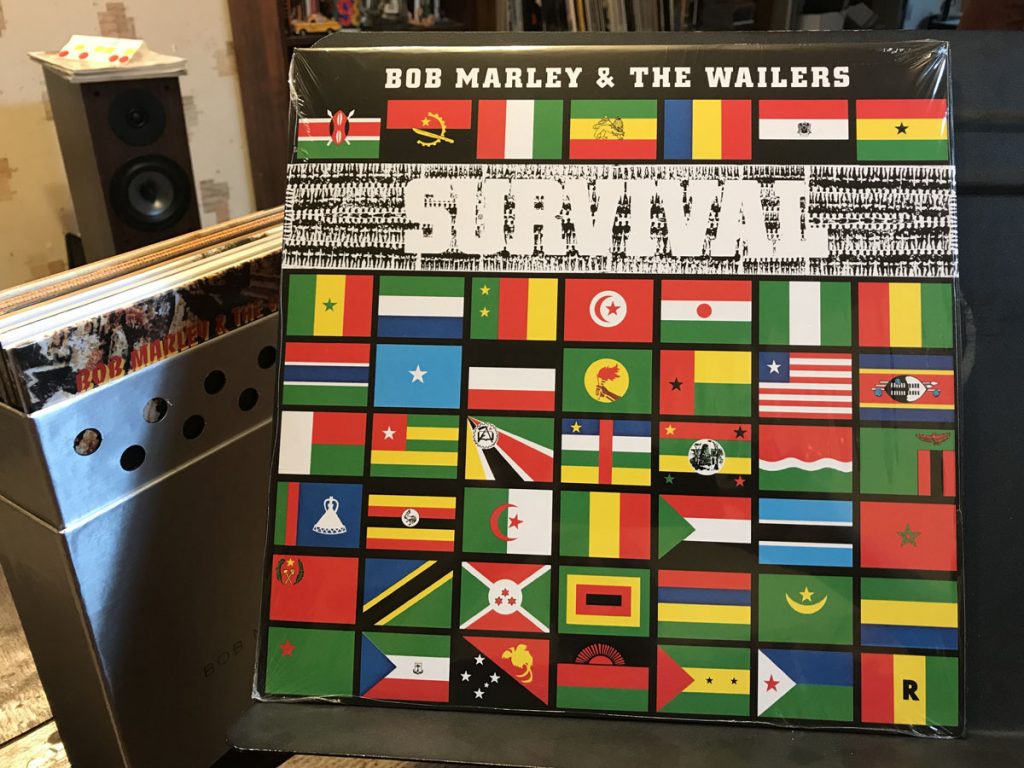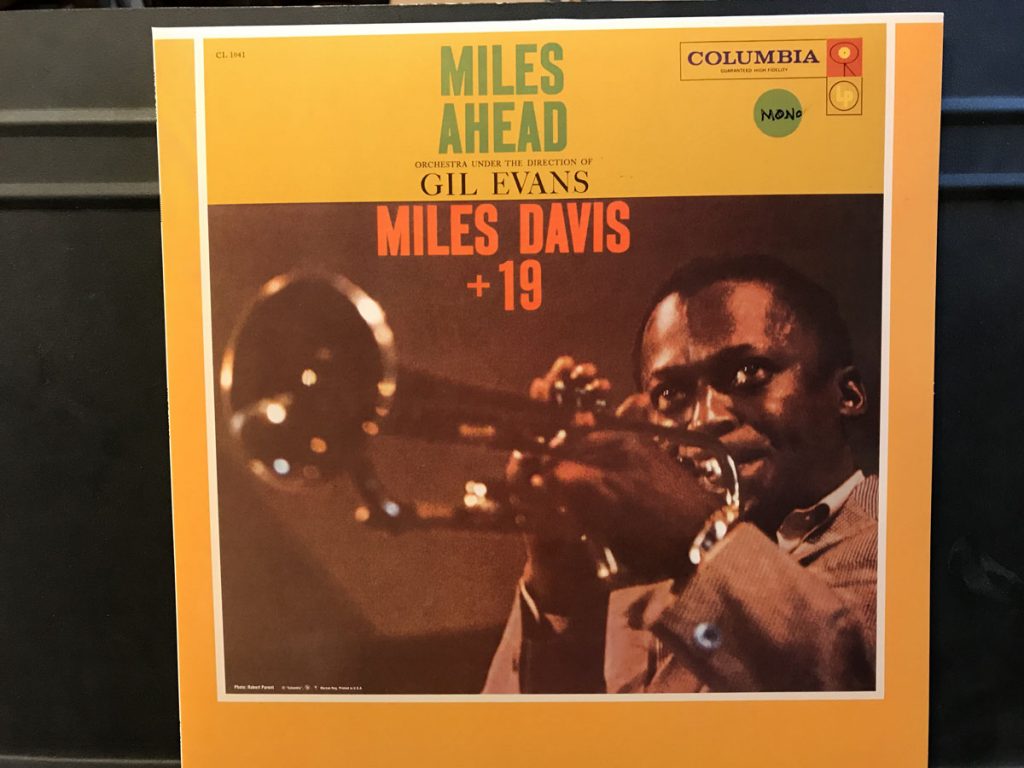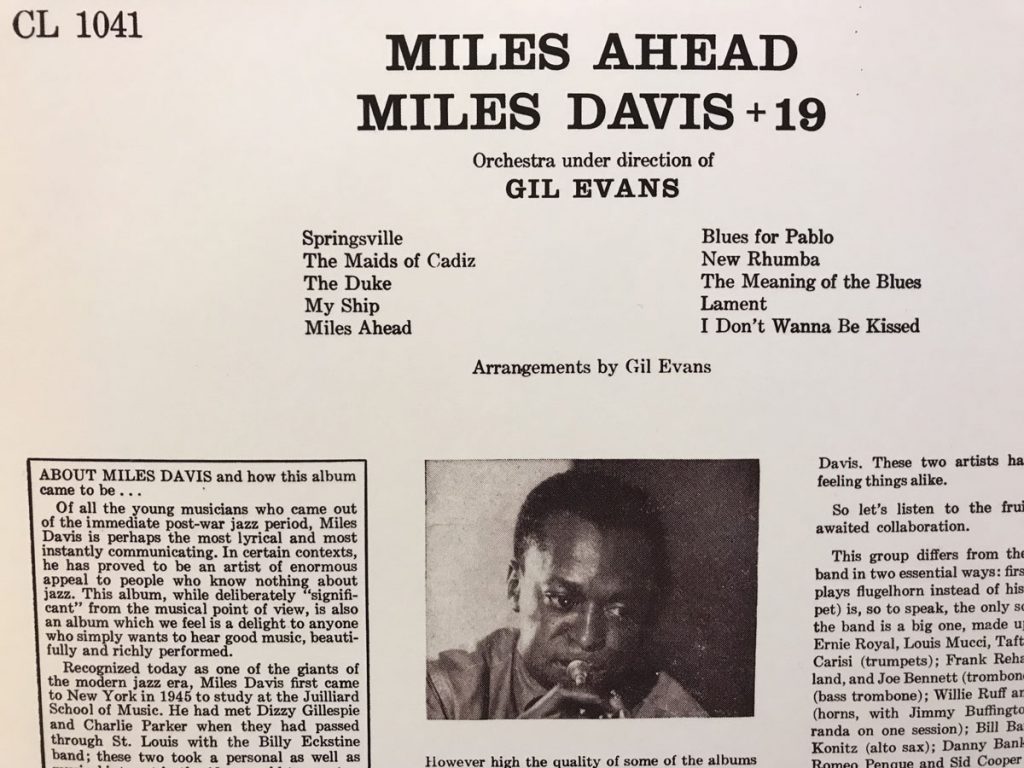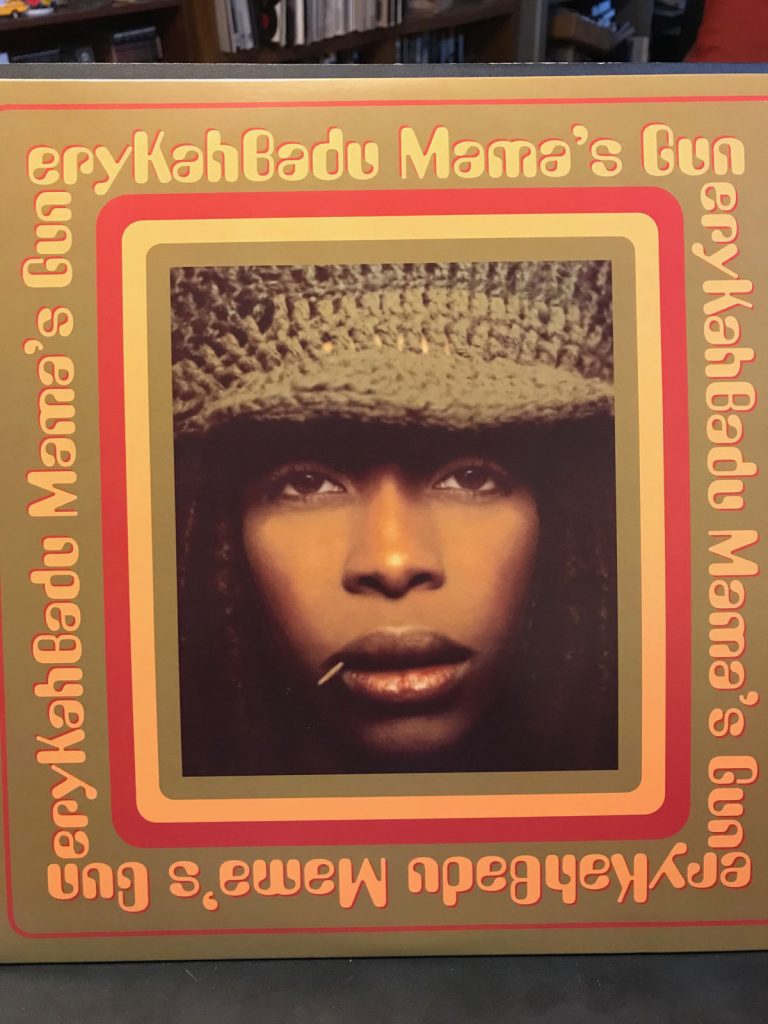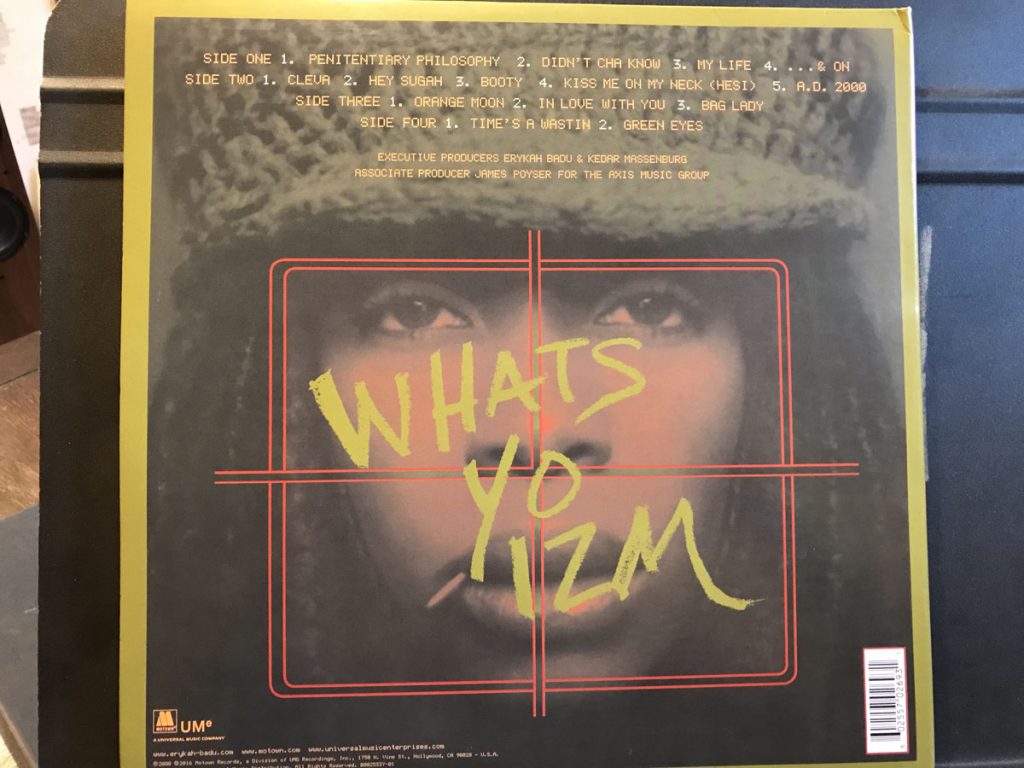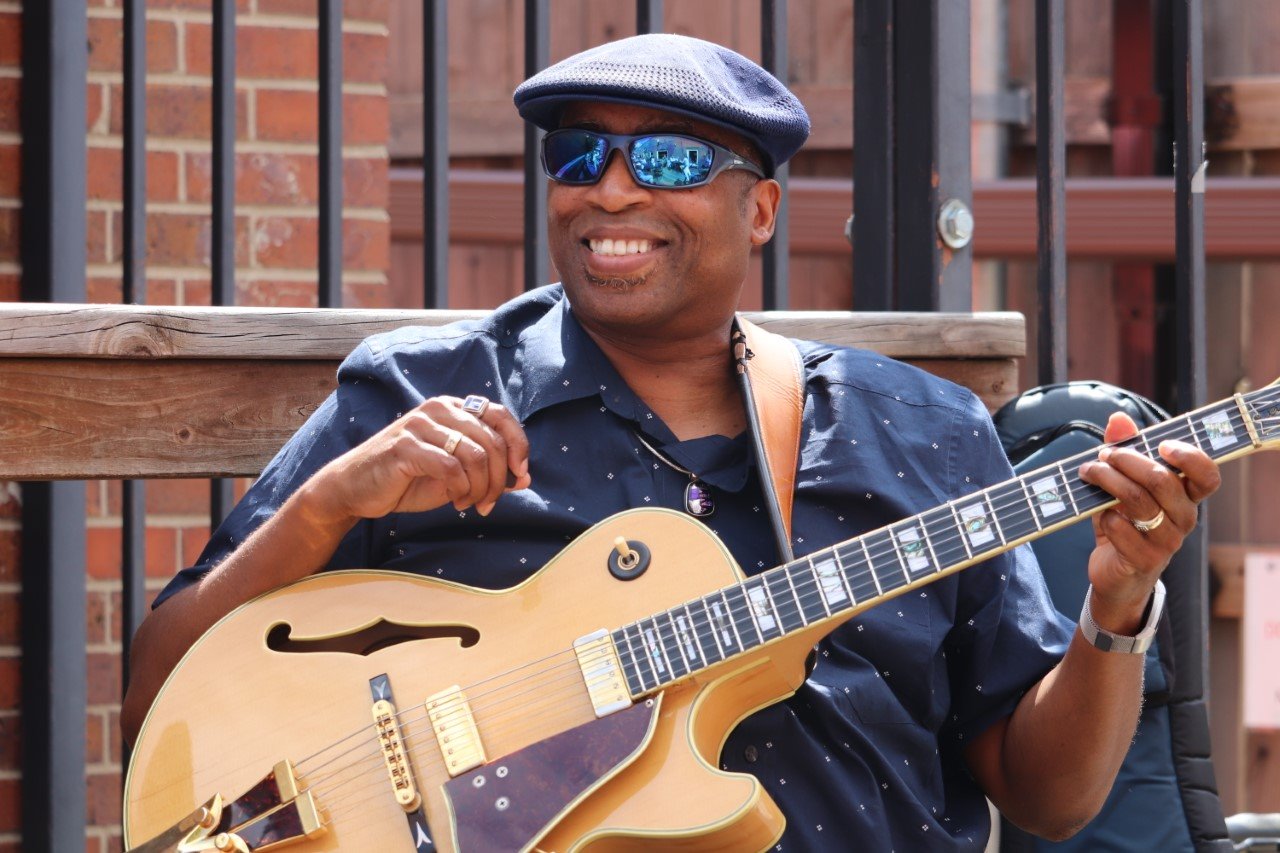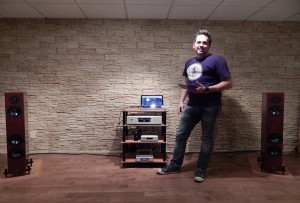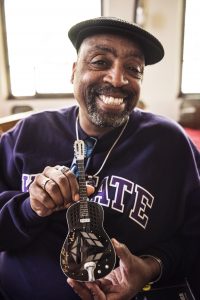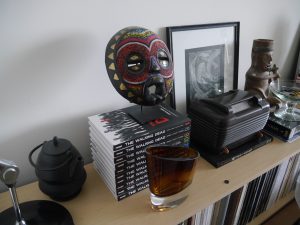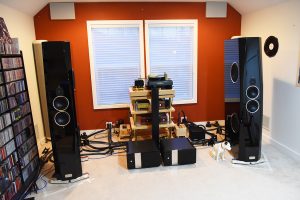The first track sounded a little thin, but it's most likely the quality of the recording, because the second track, "Pleasingly Plump" had more of a full-bodied sound. These Daedalus Audio Athena v.2 speakers really captured the reverb in the room where the recording session took place, particularly during the bridge section of the song where the saxes do a harmonized minor seventh chord crescendo over the length of a quarter note, then briskly bite off the note on beat two. The muted trumpet solo also has that beautiful reverb dialed in as well, and Quincy's love for Basie comes shining through. The entire listening experience was so palpable it transported me all the way back to when I was a graduate student working on my Masters in Music Education in Chattanooga, Tennessee from 1983-'85. I used to listen to the album daily—on a self-contained Realistic turntable that sat atop the music file cabinet in the back left corner of my music professor's small, narrow office that had LP's stacked up on yet another file cabinet. London Branch was my mentor's name, and he is still alive and kicking educating students down in Jackson Mississippi. I wonder if he knows just how great and permanent impact he's made? (I will send him this article when it's done.)
Now that I'd had some time for the speakers to break in and warm up, I played lots more music—non-stop vinyl assault. A few specific highlights I will mention here: I'd recently bought a box set of Bob Marley's complete Island recordings from Chad Kassem.
"Likkle more drums," Bob says as the first track opens, and within seconds we are natty dread—err'ting's irie, yah mon? I then cue up "So Much Trouble In The World" and I hear and feel the skank of Tyrone Downie's keyboard part—his only role is to play the shorty punchy little jabs on the 'and' beat (this music is deliberately never "on the one" as James Brown says.) The percussion is poppin' like corn. You can hear the guiro being scraped so clearly. The ratchet sound, the handheld shakers—it's all there floating above the dub-style bass lines. And the section of "Wake Up and Live" where the sax solo occurs is even more impressive—Bob Marley is literally doing the patented James Brown screams! I don't think I have ever heard it better.
To my senses, the bass is balanced delicately, not too forward—never obtrusive. In fact, my ears generally wish there was just a touch more—but that's just me and my solid state muscle memory talking. Meanwhile, the Prime Scout turntable was rock-steady, always silky smooth, like the well-oiled machine that it is.
I have psychological trauma from the early albums that pretty much got ruined with bad, cheap diamond stylus needles that were inserted on low-budget tonearms that had no good balance or correct settings of tracking force—the sum of which inevitably led to damn-near every one of my albums having horrible sound toward the last two tracks of each side, where the revolutions grew smaller, tighter, thinner in size and sound as every second passed—the grooves worn down from relentless repetitive plays…
Upon reflection, and after listening to Bob's beautiful sonic sensations, I compared notes with the Basie response. On the whole, while I was satisfied with the experience of hearing that album which took me down memory lane, I must admit that the Ortofon Black 2 cartridge was probably not nearly as forgiving for the older Basie Verve pressing recordings than the newer 180-gram pressing of Marley's box set. Which means I need to do more experiments with cartridges to find out what yields optimal results.
With regard to volume levels on the LTA MicroZOTL preamp, when I set it level '25,' Bob's tracks come across quite clean and comfortable, so...I cranked up the volume to '45'—and things got even nicer, cleaner, sharper—more present, in-your-face.…I'm feelin' the love now. "De Babylon system is da bonfire, a fallin' empire, suckin da blood of the suffferaahhs!"
But you really haven't heard anything until you've heard the stunning clarity of "Africa Unite"—this track alone should be used as a reference source for any sound system worth having. I cannot tell you how much is going on in that tune—triangle pinging in the back; scrapers, shakers; the flute solo; the shimmering cymbal, all over the rolling bass, with the i-Threes beautiful perfect synchronized three-headed female harmony, with Bob crooning with the silky rough voice that just makes you beg for a hit off that fat spliff. The 180-gram pressing of this album is just one of twelve in the box. That means we're gonna need more rolling papers!
There's something great about these two LTA units. Both the amp and preamp are so straightforward, solid, dark. Sturdy. The amplifier has nothing but a short, recessed toggle switch sitting comfortably in an oval, to the left of a lone power light to let you know it's on. The preamp has some seriously bright digital numbers that will hypnotize you if you stare at them too long! I kinda did that…because I really like the way those big bright-white numbers look. I couldn't help myself.
With the volume set back at '25,' I opened up a brand new copy of Sony's recent pressing of a mono version of Miles Davis' Miles Ahead LP and listened.
It was my first opportunity to take advantage of the "mono" button on the ModWright PH 150, and I bought this album and also Miles' Around About Midnight just for this purpose. It sounded a bit thin, not the level of depth I expected—just not enough bass for me. Maybe it's just me. The orchestra sounded great but it didn't seem like the bottom end was there (I like big bottom and I cannot lie!) By the time the "Maids of Cadiz" came on, I cranked it up to '30,' and it sounded better. Miles' flugelhorn was crystal clear. And the genius of Gil Evans came to life—things then seemed to emerge unexpected, sonic surprises scattered across the tracks.
I must say, I suddenly got a rush—this is kinda like having Christmas come early—these are expensive toys. These damn Athena v.2 speakers are just waitin' for someone to dare them to open up. And I realize this entire industrial-strength package is daring me. On the third track of Side 1, of Miles Ahead, "The Duke" was crystal clear, with the soft shuffle of Jimmy Cobb's snare brushes, not to mention the floating bass line of Paul Chambers underneath, and the fat round trombones in the middle, and shouting trumpet section in the transitional sections, and the tuba's descending countermelody. The last track on the first side, "Miles Ahead" sounded the best of all of these first five songs—which, of course, is the exact opposite of my traumatic childhood experience! Things seemed to get better as the LP threads wound smaller. And you know, there's really nothing quite like the feeling of a heavy platter—I flipped it over, and "Blues for Pablo" was sooo warm in the warm spots and the trumpets were really hot in all the hot spots—what an incredible track—Gil had those horns miked just right, and Miles' flugel was so warm and round. I could go on and on about the next four tracks, but I need to go on—and on—to the next platters that matter. Next up was Erykah Badu and Mama's Gun.
The sound of this album just didn't do anything for me—maybe it was 'cuz it was supposed to have that ol' school retro mix—I don't know. But it just didn't have the depth that I wanted somehow. But wait, did I leave the mono button on?? Oh my gawwd… . Yep—and all of a sudden, presto! Shit be poppin' like corn again! Ok, so let me listen to Erykah all over again…and all that juicy neo-soul did indeed come pouring forth, finally. I listened to the entire side 3 of the double LP, which had three of my favorite tracks "Orange Moon," "In Love With You," and "Bag Lady." The slippery-slide acoustic bass lines were caramelly underneath her alto vocals, the drums were crisp and clear. "In Love With You," is a great track that features Erykah's unique voice against Stephen Marley's gravelly singing. He's also playing acoustic nylon string, along with overdubbed finger snaps that sparkle. "Bag Lady" features the military rat-a-tat-tat drum groove over the springy-percussive bass line. These speakers are doing a wonderful job of keeping the various layers separate—shimmering and clean on top, a warm bass line on the bottom, and all the mid-tones of the Fender Rhodes and synth keyboards in the middle, with a serious presence of drums where you can hear the separation of cymbals, snare and hi-hat. And then there's that delicious guitar riff floating through it all. This sound is now melting me.
At some point, I took a little break from listening, and switched it up for a few hours of my other pastime activity—reading! I happen to pick up the latest issue of Rolling Stone magazine, and there's quite the provocative cover of Zoe Kravitz, the daughter of rock star virtuoso Lenny Kravitz, who ranks only second to Prince in terms of flat-out multi-talented badasses who have mastered vocals, guitar, bass, piano, and drums—and plays all the instruments on many of their albums. His daughter is now a rapidly ascending star, hence the feature cover story of the "Hot!" issue of RS. The article is great, intriguing, and reminds me of how much I always dug Lenny's music—ever since my bass player Lebron Scott joined his band and wound up in the very first video with Lenny on Kravitz's debut album Let Love Rule.
Why am I telling you all this? Because this article led me to wonder: What would this killer rig I got downstairs do for the Kravitz collection? I had to find out! So I hopped online and quickly spent about a hundred dollars on several brand new copies 180-gram vinyl double-LP sets of Lenny's best early works, namely Let Love Rule, Mama Said, 5, and his newest album, Raise Vibration. These were all fairly new 180-gram vinyl double LP re-releases from EMI/Virgin Records, who does a pretty good pressing of vinyl, so I couldn't wait to get them in the mail, and I made sure they were 2-day delivery so that I didn't have to wait long. (Note: The LPs arrived, but since this article is so long, the results of the listening session will appear in my next article.) Meanwhile, lemme pillage and plunder some earlier fresh meat I'd bought. Let's listen to something rare.




